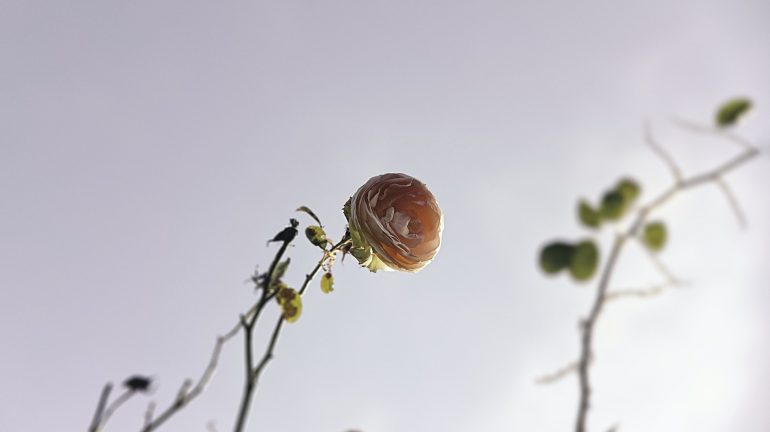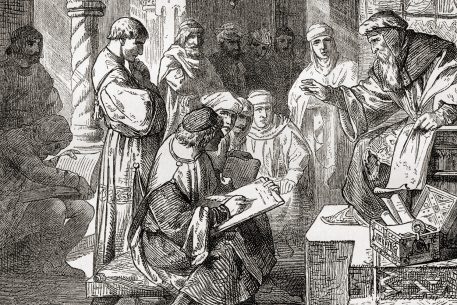The Lollipop Fields
Soaring upwards, little swayed by draft or cool current, the silver balloon became a shimmering dot in the sky. A little girl jumped, thrusting her hands into the air, hoping she might catch the string that floated behind. But it was too late. The balloon was gone. Next to her, a freckled boy looked guilty. Blue eyed, black fringe and small shorts, he shuffled on the spot, shrugging his shoulders.
‘You said you’d catch it!’ she cried. But the balloon had been too quick.
Convinced of his own speed, the boy had released the balloon. He reached upwards, caught the string and dragged it back down. The dare was repeated. He lingered a little longer before jumping, grabbing the fleeing cord. Success! A dizzying rush of blood to the head. He opened his hand again. The balloon soared.
Overconfident, he waited too long to catch it. The balloon took its chances and escaped upwards, out of reach. The upstairs windows, the roof tiles and chimney pot, all sleepily warm in the afternoon sun, didn’t notice as the balloon climbed ever higher. Up and up it went, into the infinite blue sky. Against the wall, the little girl cried. The orange day baked heat into the rough burnished bricks as her tears dripped onto the concrete path. It seemed that the silver balloon would be impossible to forget, soaring further and further into the heavens, more unreachable with every moment.
In the cool hours of the evening, the boy tried to cheer his little sister. In his hand he held an offering. Little slivers of silver lay on his fingers; his own balloon he had ripped to pieces. It would never fly. Like tinsel, it shimmered as it fell to the floor. He did not deserve a balloon if she was to be miserable.
The lollipops grew in the field on Sundays. The children’s father ventured outside into the dewy garden, making sure all the greedy gnomes had gone, before allowing the girl and boy to pick the delicious fruit. The tiny child fidgeted with excitement, as her father buttoned-up her light jacket and tucked it up around her neck. His cold wet hands rubbed off her throat, making her shiver excitedly. ‘Was there many lollipops today?’ she asked. ‘Had the birds taken too many?’ He smiled and kissed her forehead, which wrinkled with momentary anxiety.
She and her brother ran outside. The breeze drifted over the grass as she gazed at the garden. Scattered all over the lawn, between the daisies, round lollipops peeked out of the ground. Vibrant red, soft pink, tangy yellow and citrus green, they grew up like jewels out of the soil.
The dew sparkled on her shoes, as she ran from jewel to gem. The air clouded and floated upwards with each breath. Bits of earth stuck to the lollipops’ stems, as she plucked them out of the earth. She brushed the dirt off and slipped the delicious fruit into her mouth.
What novelty, what life, what exquisite joy! A world of lollipop fields, silver balloons and tinsel corpses. The little girl looked upwards, remembering her balloon, soaring ever higher. She’d almost forgotten it. How far away was it now? With the stars? Maybe it’d been caught by a passing plane? No, it soared upwards forever!
On Saturday nights, she stared out of her window, waiting for the gemlike fruits to start lifting out of the soil but none appeared. Her eyes grew heavy and millions of stars – possibly escaped silver balloons – urged her to sleep. Yet, every Sunday, lollipops grew on a carpet of green, rising out of a world of magic. Maybe her balloon would reach the top of the sky, then what? Would it poke through the darkness and appear in another world, a lollipop out of the soil?
The field of hay was dry; the girl and boy, a little older, played in the dregs of summer. Billowing clouds frowned as they whisked across the horizon. The air was gusting and sharp, ready to burn flesh and wear stone. The grass rustled and rippled, the trees sneezing and shaking as they became brown and dry.
Hoods up, trousers on, the children raced through the long grass. It caught their legs and feet, dragging them to the ground. All flushed cheeks and bright eyes, they fell onto the waves of grass. A black Labrador bounded after them, barking.
Looking upwards at the sky, the girl watched the stalks sway from side to side. They curved slightly, weighed down by rows of heavy seeds at their tip. She plucked a blade and ran her thumb and index finger up the wiry stem, watching as the seeds burst off like a fountain, falling on her face.
Shaking her head, she knocked the seeds onto the earth, spitting one out of her mouth. She could feel the wind push against her back, forcing her to her feet, dragging her as hard as it could. Her heart pumped hot blood through her limbs, the cool air filling her lungs.
The black Labrador bounded between the children, barking excitedly. He jumped up at her brother, pushing and jostling. But the boy didn’t want to be left behind his younger sister. He pushed the dog aside. The black dog persisted. The boy’s face grew redder with impatience. ‘Stop barking,’ he exclaimed, growing irritated. He ran forwards, ignoring the Labrador. The dog, misunderstanding the boy’s annoyance, leapt up, nipping the boy’s hand with his teeth. Crimson blood flooded out.
The boy roared in shock. The fluid dripped from his hand onto the golden grass. The dog, realising he had caused pain, crept forward to give comfort. The boy’s face reddened with anger. He lifted his foot and kicked the dog hard into its side. The dog whined, a fearful look in his eyes, yet ready to return to the angry child. The boy kicked the dog again. The little girl cried. She ran up the fields, the hot tears running down her cheeks. The field, the rustling grass and roaring winds became unexpectedly savage.
Later, her brother was sent to his room by their father, a prisoner for his crimes. The scar on his hand was cleaned and wrapped. The kind dog forgave, the lollipops grew and the balloon continued higher.
The little girl grew taller. Teenage. Awkward. Lightly sleeping, she heard muffled voices in the kitchen. She turned over. The light above the doorway lit her room with defused shadows. Her eyes opened.
Raised voices. Disturbance. Outside her bedroom door, footsteps frantically moved. Sick to the stomach, she threw back the covers. She reached for the handle of the door, walking down the narrow hallway, rubbing her eyes. The lights were blinding. The kitchen door swung open.
‘Get sick, you stupid bastard!’ her father shouted, his voice breaking with fearful emotion. He looked at her. It was the first time she’d heard him swear. There was terror in his eyes. Next to him, leaning over the sink was her brother, damp hair stuck to his pale cheeks. His eyes rolled backwards. Beside them, sitting on the table, were empty bottles of tablets.
Dazed, the girl turned to the telephone. Her father shouted about an ambulance. Her hand stretched out but it couldn’t reach, the phone moving further away. Her head grew light. Her legs caved, knees weak, and she felt herself fall silently downwards into darkness.
The church smelt of lilies. The little girl, now grown, sat by her mother, watching her brother by at the altar with a rose in his buttonhole. Smart, tall, slightly lined, he only faintly resembled the little boy she remembered. Time passed; he had moved away, their relationship was one of childhood memories, where every feeling had been magnified – the overwhelming pain of scraped knees, the torture of vegetables, the joy of sweets, and running so hard her chest might burst.
Now it was all order. Routine. Responsibility. Had he felt the same? She’d never asked. Weekend breaks and occasional holidays left little opportunity to know a person. People became snapshots, growing faintly older with each visit and occasion. Painful reminders of time passing.
The joy of the occasion vanished, replaced by an ache. It wasn’t time passing that seemed terrible, rather it was the loss of connection, the feeling of isolation, realising the nearest people to her were almost strangers. Her brother, once such a confidant, was now unfamiliar. The distance, once indistinguishable, had become worlds apart. The youth they had shared, wily balloons and silver corpses were just memories.
Her mother patted her hand. She looked old. Reclining in her ear was an ugly beige machine, plastic yet necessary. Their father was long since gone – a stroke and his time had been counted. Now no lollipops grew in the garden. Time made fools of them all.
The organ began to play. The congregation stood up. She turned to look at the rear of the church; the wooden doors opened. The bride entered. In a dazzling orange wedding dress.
‘Thank god your father’s dead.’ whispered her mother, not knowing the level of her voice. People turned and looked. The girl smiled.
This was life. Time would pass, as would people. Eventually memories would become nothing but shimmering silver dust. Yet, one balloon remained soaring, heedless of the world calling it back.






